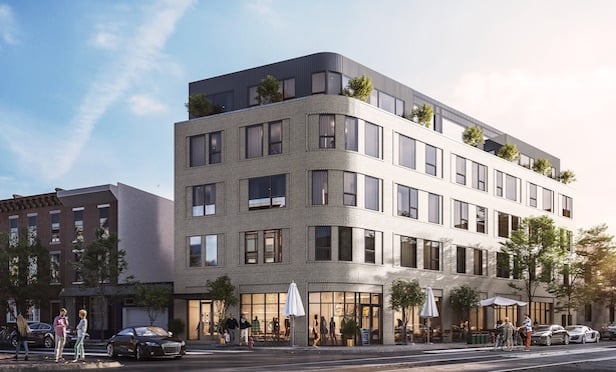 Common Frankford rendering/ Image courtesy: CANNOdesign
Common Frankford rendering/ Image courtesy: CANNOdesign
NEW YORK CITY—The shared economy wants to come to your living room. The New York City-based co-living company Common is expanding to Philadelphia, Atlanta, San Diego and Pittsburg in the next three years. Common is planning to spend more than $300 million in building ground-up developments in those four cities. Co-living offers a bit more privacy but shares some of the same concepts of dormitory living. It's focused on adults interested in creating a residential community with affordable rents.
Residents are members who rent furnished rooms. The housing provides cleaning services for shared spaces, community events, shared supplies and focuses on online technology in operations.
The company already has housing in six cities. Brad Hargreaves, founder and CEO of Common, says the demand for co-living continues to rise. “We've seen a real need for innovative housing solutions in growing, mid-size cities that are facing challenges of rising rents and demographic change,” he says. “Philadelphia, Atlanta, San Diego, and Pittsburgh present Common an opportunity to offer cheaper rent, needed density, and amenities that foster community.”
Founded in New York City in 2015, the company has grown to be the largest co-living operator in the US. It has more than 700 beds in 24 buildings. In addition to homes in New York City, Common operates in Chicago, San Francisco, Oakland, Los Angeles, Seattle and Washington, DC.
Common will open its first Philadelphia co-living home with developer Elk Street Management. They plan to launch the 72-bed development, Common Frankford in the Fishtown neighborhood in 2020. The housing company describes the area as one known for its arts scene, restaurants and public transportation. With Elk Street and other Philadelphia developers, the company is also working on over $100 million of new co-living projects totaling 1,000 beds.
At Common Frankford, rents will start at $995. The home will offer co-living suites as well as studio and one-bedroom apartments. It will provide furnished shared lounges, shared kitchens, in-unit laundry, bike storage and an outdoor terrace. The idea is for affordable rents with high quality housing to offset the pressure of rising rents in the highly desirable neighborhood.
In Atlanta, Domos is investing $75 million in co-living developments with Common and has a pipeline of 600 co-living beds. Their rental housing is targeting young professionals. Common points out with the headquarters of Delta Air Lines, Coca-Cola, UPS, Home Depot, and others, Atlanta has become a magnet for companies and jobs. But its housing supply has not kept pace with the growing population.
Common has a pipeline of 300 beds in San Diego. Some of the housing is being built in partnership with architect and developer Jason Maune. With Maune and other developers, Common plans to bring more than $60 million in co-living developments to the city.
Common notes that 70% of San Diego's 20- to 34-year-old population is unmarried and 65% of non-family households rent their homes. In addition, it states San Diego has the ninth highest rent in the country, 50% higher than the national average for a one-bedroom apartment.
In Pittsburgh, Common's pipeline exceeds 300 beds. It's working with multiple developers on $75 million in new co-living projects in the city. The housing company characterizes Pittsburgh as fast growing, and professionally diversified with new jobs in technology, medicine and education. It points out the growing employment opportunities have created competition for housing, causing rent increases and pushing people out of neighborhoods. Thus, it asserts co-living offers a solution for the city's housing affordability problems.
In addition, Common has also previously announced plans to expand to New Orleans and Newark, NJ.
Common states it retains 99% occupancy in its buildings and receives over 2,500 new membership applications per week.
© Touchpoint Markets, All Rights Reserved. Request academic re-use from www.copyright.com. All other uses, submit a request to [email protected]. For more inforrmation visit Asset & Logo Licensing.







